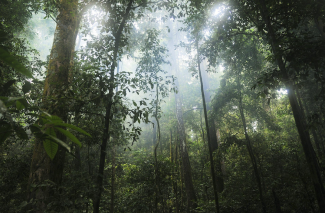Peru is the fourth largest rainforest country, and its Amazon forests are one of the most biodiverse areas in the world. However, deforestation is a growing phenomenon. According to Peru’s Ministry of the Environment, from 2019 to 2020, about 203,272 hectares of Amazon forests were cut down during the Covid-19 pandemic. The Rainforest Foundation US reports that Peru ranked third in Latin America and fifth worldwide among tropical countries in forests loss in 2019.
Peru’s Environment Ministry states there are three direct causes of deforestation: agricultural expansion, illegal and informal extractive activities, and expansion of infrastructure for communication, energy, and extractive industries. Among the indirect causes that contribute to deforestation, corruption has been identified as a key component of forest loss.

Corruption can be understood as the abuse of entrusted power for private gain. The main component in this definition is “entrusted power,” which applies to the power exercised by public and private actors, and relations between private parties. For example, Indigenous community leaders have been entrusted by their community to have authority over access to the community’s land; therefore, power has been entrusted to them, and they can abuse that trust to benefit themselves in the form of a bribe.
A link can be established between deforestation, systems of corruption, and the use of natural resources. Governments are guardians of the forests people depend on for their livelihoods. However, many authorities face the problem of overlapping land use rights allocated through concessions, titles, and other forms of land use rights. In some Peruvian Amazon regions, such as Madre de Dios, a recurring problem is forest concessions overlapping with mining concessions.
A forest harvesting license (an authorization, concession, or permit) gives an individual the right to sustainably log certain species of trees in a restricted area, according to its forest management plan. The entities responsible for supervising this activity are Peru’s Agency for the Supervision of Forest Resources and Wildlife (OSINFOR, by its initials in Spanish) and the regional governments.
How does corruption play a role? It is common practice for timber harvesters to engage in agreements with illegal or informal miners to allow them access to their concessions. Currently, it is illegal to conduct mining operations within forest concessions. However, when OSINFOR inspects a forest concession that overlaps with a mining concession, it cannot attribute administrative responsibility for past mining activities because they were authorized at some point. In many cases, this misconduct is not sanctioned, and no one is left to repair the environmental damage. Uncertainty about land use rights weakens OSINFOR’s supervision and enforcement powers.
A pending task for the Peruvian government is to define what it wants from its forests. Peru’s Forest and Climate Change Strategy Policy proposes strategic actions to promote sustainable forest landscape management, increasing forests’ value. However, it does not set timetables nor clear objectives. While it is an important document, it needs to elaborate clear and binding legal requirements to be truly effective.
Furthermore, the country still lacks a national policy on artisanal and small-scale mining. As of January 22, 2022, the first multisectoral policy for small-scale mining and artisanal mining, led by Peru’s Ministry of Mines, was in the development process. Addressing the complexity of mining activities in the Amazon Forest will be a challenge for policymakers, since this policy will have to consider the problem of overlapping land use rights, the environmental impacts of alluvial mining, and the insufficient interagency coordination between national, regional, and local authorities.
Corruption affects the sustainable use of natural resources. Legal logging and formal mining in the Amazon Forest have the potential to become sustainable and reputable productive activities. However, corruption stains these activities by blurring the limits between illegal, informal, and lawful practices. About 37% of the timber inspected by OSINFOR in 2017 had illegal origins. And 70% of Peru’s gold exports from 2015 to 2019 are believed to have come from informal, unregistered, and illegal mining. With such entrenched patterns of illegality, the costs of complying with the law may seem to some actors like a burden compared to the gains received staying outside the law. However, society pays the cost of corruption. Corruption pervades the justice system, diminishes state capability, raises the levels of violence against environmental defenders, and enables criminal networks to commit human rights violations.
Deforestation is a multicausal problem. Fixing this problem will require addressing its direct causes and the indirect factors perpetuating it. The country urgently needs to develop a national land use plan, improve prosecution of environmental crimes and organized crime, protect environmental defenders, improve articulation and coordination between entities, and increase human resources at the regional government level.
Most importantly, we need a mindset change. Forests are key ecosystems for life on earth. They provide food, fuel, and medicines. Forests clean the air, store carbon, filter water supplies, control floods and erosion, sustain biodiversity and genetic resources, and they are home to many Indigenous communities. We cannot afford to lose such a beautiful, unique, and complex part of our history, pride, and identity.
For more information of ELI’s work in Peru and other Inter-American countries, please visit our Inter-American Program page.
